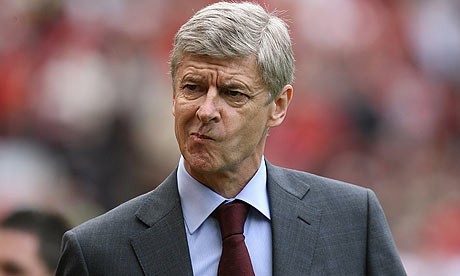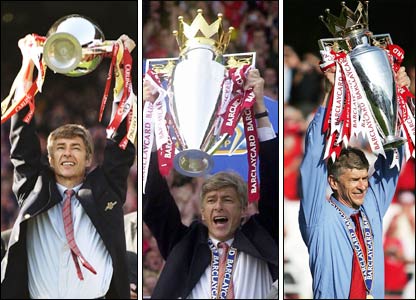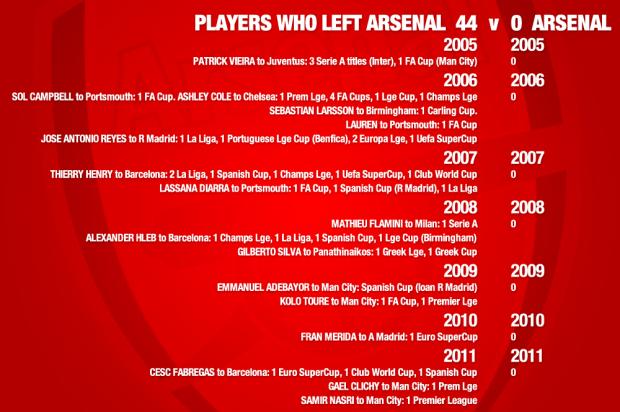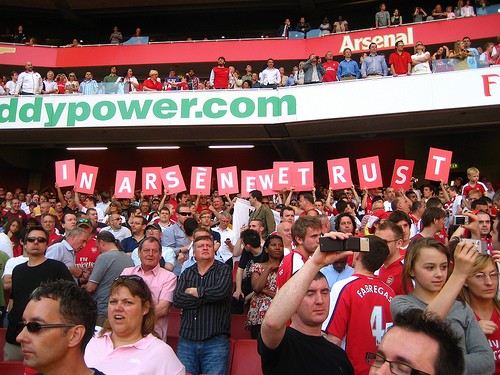Surviving 18 seasons as the manager of a football club is no mean feat in any part of the world. Arsene Wenger hasn’t managed it with any ordinary team, but with one of the top European clubs of the last two decades – Arsenal. The Frenchman’s time at Highbury, from 1996 to 2006, was full of success and silverware. His ideologies were revolutionary, as he brought in young talents from abroad at cheap prices and turned them into the best in the world. His insistence of free-flowing, attacking football made Arsenal a favourite among neutrals. The ‘Invincibles’ side of the 2003/04 season is arguably the greatest ever in the Premier League, and their achievements will certainly not be matched by anyone in the near future. In 2006, Wenger led to Arsenal to their first ever Champions League final, which they agonisingly lost to Barcelona. The future seemed to be looking up.
Since 2006 though, as the club moved from Highbury to the Emirates, things have changed. Where the last decade saw Arsenal win 12 pieces of silverware, including 3 Premier League crowns, the last 8 years have seen the Gunners win just 2 trophies. Both these victories have come in the last few months, as Arsenal won the FA Cup last season, followed by the Community Shield.
The typical Arsenal season now follows a very similar pattern, year after year. A barren transfer window is followed by a couple of last-minute signings, bringing a huge sense of optimism among the fans. The start to the season is usually good, and title ambitions are well on-track going into Christmas. Then comes a certain point where they face big-teams in succession and completely capitulate. A big threat of finishing outside the top 4 ensues, but a strong finish ensures Champions League football by a whisker and leaves the fans believing that the following season will be better.
What has changed? How has Arsene Wenger, the man heralded as the best manager in the world at one point, overseen a period so devoid of success? There are several reasons, and here, we take a look at 3 major ones which lead us to believe that Wenger is no longer the right man to be the manager of Arsenal Football Club.
1) Outdated methodologies, resistance to change:
At the turn of the millenium, Arsene Wenger’s strategy of bringing in cheap foreigners (mostly French) and nurturing them into the Arsenal side, worked perfectly. The likes of Thierry Henry, Robert Pires, Patrick Vieira, Marc Overmars and Dennis Bergkamp were all transformed into some of the best players in the world during their time at Highbury. The winning mentality was well-bred into these youngster by Wenger, and they responded in maginficent fashion.
Now though, the footballing world has changed. Money-power has taken over, and clubs who spend more money invariably end up being more successful. Players too, have changed, and want more money and instant success. There were teams who were earlier not accustomed to this, but changed accordingly. Sir Alex Ferguson is the perfect example, as his Manchester United side continued their incredible success even after the likes of Chelsea and Manchester City resorted to big-money spending.
Wenger though, has been left behind. He still continues to follow his age-old method of signing players no one has ever heard of. The players that do get into the first team and make a notable impression though, are soon tired of Arsenal’s lack of success. This, in turn, leads them to leave the club. Ashley Cole, Samir Nasri, Cesc Fabregas, Robin Van Persie, Alex Song…..the list goes on.
Big teams spend whatever it takes to get their desired players. Wenger, on the other hand, is always on the look-out for the cheapest option. This summer, for example, Arsenal clearly needed a proven goal-scoring striker. Instead of breaking the bank to get Edinson Cavani or Radamel Falcao (both of whom were available), Wenger signed Manchester United-reject Danny Welbeck on deadline day.
2) Lack of killer instinct within the team:
The successful managers of the modern era all have a very common trait – they get things done. Even when their sides have their backs stacked against the wall, they find a way to motivate their players and make them perform when it matters most. Jose Mourinho, Sir Alex Ferguson and Pep Guardiola are prime examples of this.
Arsenal were once a force to be reckoned with, but are no longer considered a big threat. This is mainly because they have had countless opportunities at glory, but have let it go time and time again. Therefore, no one really expects them to have a major impact, knowing that the Gunners will mess up at some point.
The Arsenal sides of 2007/08, 2009/10 and 2013/14 all had very real chances of winning the Premier League. Last year, they led the table for a total of 128 days throughout the course of the season. But in the end, they finished 4th.
3) Blind support from fans and management:
Despite his incredible dearth of silverware at the club, Arsene Wenger hardly received any criticism from his own fans until the last couple of seasons. Even now, there are many who believe that he is the man to take the club in the right direction.
Also, the board at Arsenal seems to have given Wenger a contract-for-life, and seem to be too scared to sack the 64 year-old. This sense of job security for Wenger has done more harm than good to the club. In a day and age when managers are always losing sleep fearing for their jobs, Arsenal’s loyalty towards Wenger is like a breath of fresh air. But everything has a tipping point, and Wenger’s has come long back. Even then, he continues to be at the helm at the Emirates.
Therefore, even though it will be hard to take for the fans, Arsene Wenger needs to leave Arsenal for the club to head in the right direction. His achievements and contributions to the Gunners are undoubtedly remarkable, but his outdated methods and ideologies are doing more harm than good at the moment. The board therefore, needs to take this bold decision for the betterment of Arsenal Football Club as a whole.
Add Sportslens to your Google News Feed!



